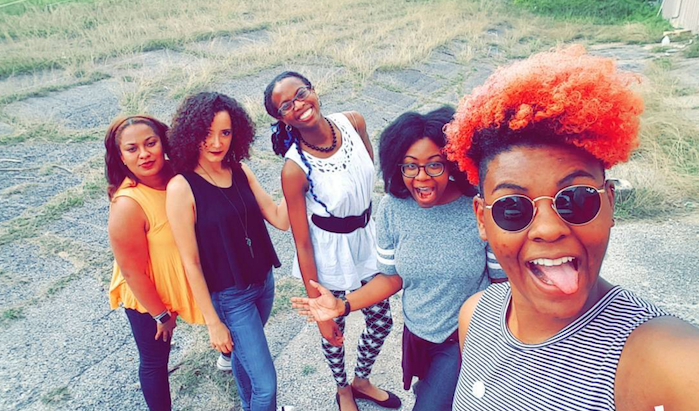
The Ginas never laugh alone. Whenever one member of Austin’s first and only all-black, all-female improv troupe cracks a joke or starts a giggle, every member lets out a big, knowing guffaw.
Cene Hale, Maggie Maye, Ronnita Miller, Tauri Laws-Phillips, and Xaria Coleman all have infectious laughs, and as they spread, the sound of their chuckling infuses an awesomely intimate warmth, sincerity, and affirmation into each moment of hilarity. The friendship and deep connection these women share is in every giggle, every crinkle of the eye, every knowing glance or “yessssss.” The Ginas’ friendship is even more powerful because each member spent so much time feeling alone as the only black girl in the room. Now, these babes who all felt like outsiders are in fucking formation. And they’re changing minds about the way people of color are represented on stage, confronting problems that exist off-stage head on.
“Do you always feel popular? Like people get real excited to see you everywhere you go?” Tauri asks the delivery guy handing us pizzas in The Tigress in Austin’s North Loop neighborhood, where the Ginas and I have congregated to drink, discuss, and, yes, excitedly eat delicious pizza. We’re here two days after Damn Gina took the stage at Babes Fest during SXSW. That show was my first real introduction to Cene, Maggie, Ronnie, Tauri, and Xaria. We’d talked on the phone before, but, as hilarious and chaotic as that conversation was, anything but in-person doesn’t do these babes justice. Watching them perform, I was totally blown away. From the moment the troupe danced onto the stage and Maggie popped her legs up on the wall and started twerking, energy jumped off the floor and into the crowd. The way these ladies relate to each other up there, you feel like you’ve just met the funniest friends you could ever hope to have. Even in the audience, you’re connected, engaged, laughing along as the Ginas laugh from the sidelines, too.
Cene, Maggie, Ronnie, Tauri, and Xaria value their friendship, fun, and struggle. They’re babes because they’re there for each other, every day. They know not to give too much of a fuck. But they also recognize the strength they have together and use that strength—their humor—to express truth, work against stereotypes, and inspire others to speak out and feel comfortable joining in. An added bonus? They looooove grandmas.
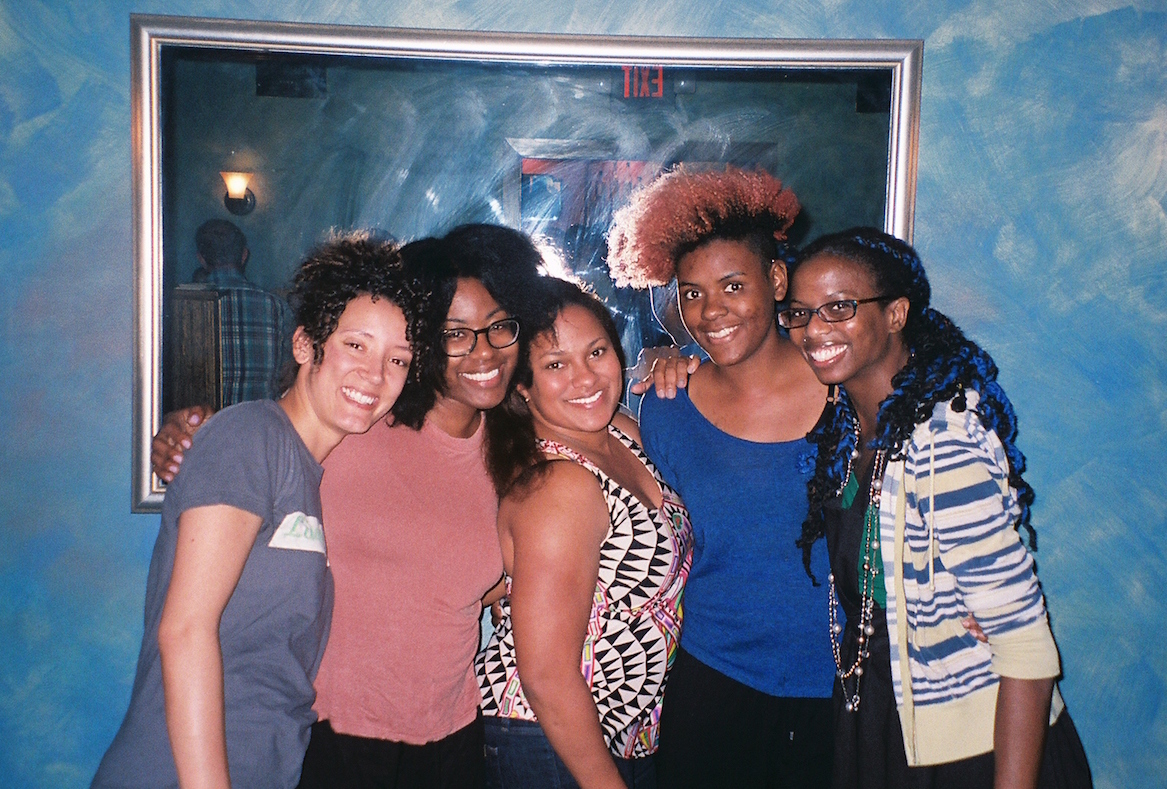
Damn Gina at The Tigress after our interview. From left: Cene Hale, Ronnie Miller, Tauri Laws-Phillips, Xaria Coleman, and Maggie Maye
What inspired you to start Damn Gina? How did it begin?
Xaria: I saw a couple of the other Ginas, and I was like, “Hey, these women are all funny. I want to be in a troupe with them.” [Laughs] Really, as far as African-American women goes, it was just us [in the comedy scene].
Cene: We all met at ColdTowne Theater. That’s where all these improv classes are, and they have a lot of shows there. That’s where Xaria picked us all up.
Ronnie: It’s awesome because when we started, we weren’t even friends.
Xaria: Yeah, I hated all of you. [All laugh]
Ronnie: We didn’t know each other. We were aware of each other being the other black person in the theater, or whatever, but as soon as I got the message, “Hey do you want to do this?” I was like, “Fuck yeah,” one, and two, “Oh shit!” I felt like I’d drag everybody down or something. I seriously said to my sister, “Oh my god, they asked me to be in this troupe of all of these frickin’ amazing women! What am I going to do?”
Tauri: And me, I’m like, “They don’t know I’m old!” [All laugh]
Maggie: I was like…let me just preface this: I think I’m hilarious. [All laugh] But I did feel like I needed a lot more training because I’m at the back of the curve when it comes to that. Doesn’t mean I’m not going to feel great about myself. [All laugh] I was still like, “Even though I know all of these girls got great stuff going on, I’m going to ask them to be in it.” [Laughs]
Cene: And we were like, “Why isn’t she in the troupe?” [Laughs] Maggie doesn’t feel good enough?! Maggie who was on fucking Conan. Maggie who travels across the country performing. [All laugh]
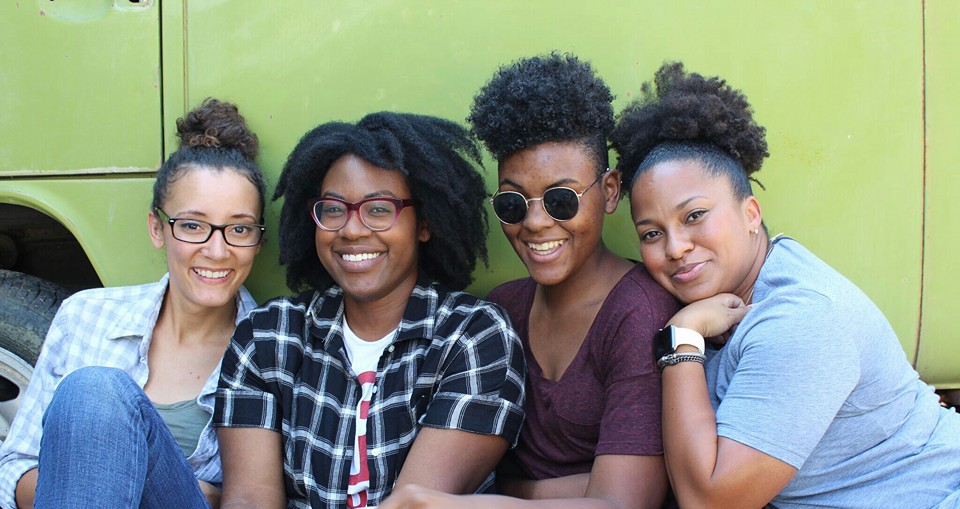
The early days of Damn Gina, before Maggie joined
It’s so awesome that you guys became such quick friends and connected like that.
Ronnie: I don’t know about you guys, but I waited my whole life to have black women as friends, honestly. [Laughs] I lived in a lot of places where I was, like, the only one or one of a handful, and then it was like, “Oh you’re the only other one in the room, we have to be competitive for whatever dumb reason.” When we first met, we all understood each other because we had a similar point of view, growing up as one of the only kids of color where we lived. It was like a sigh of relief. These people understand. I don’t have to explain everything about myself. They get it. It was easy for us to come together as a group because we don’t have to explain every little detail about ourselves. It’s just accepted and moved past.
Tauri: I think what’s amazing is that literally every single time we’re together, we find these shared, collective experiences. There are all of these things that are like, “Yeah, me too.” When you feel alone and then find out that somebody has had almost a mirror experience…it allowed us to connect really quickly.
Xaria: It’s awesome that we have similar experiences, but we’re still all super different. We’re at different points in our lives and in our careers, I guess. We’re all unique in our own way. It’s not like, “You’re all black girls.” We’re all different.
Maggie: I’m first generation American. I’m from Africa. So it’s like a whole different kind of black. [All laugh]
Cene: I’m half-white, so my experiences are obviously going to be completely different from Maggie’s.
Ronnie: I’m an Army brat, so I grew up moving around. I was born in Germany. I grew up being the kid that wasn’t black enough for black kids or white enough for white kids.
Tauri: We pretty much all were not black enough for black kids.
Maggie: Or black enough for the white kids. [All laugh] We didn’t play basketball. [All laugh] They were upset that I wasn’t like what they saw on TV. It’s really good to work with people where you know where everybody’s coming from. We have a subject matter on stage, and I know where everybody’s coming from when they perform. I’m not thinking, “…Are they trying to do something funny?” Whereas, when you’re working with people who don’t have similar backgrounds…there have been a few situations where I’ve had to let other people know, “You can’t do that. It’s embarrassing. It’s not going to fly with me.”
Really quick, what first got you, individually, into comedy or improv?
Ronnie: I always loved comedy. I would watch standup as a kid. But I first got into it because, living in Austin, I was noticing that a lot of people that looked like me did not have a voice. And I always felt like I had to be the voice for my people because people would always ask me questions. I felt like, “Okay, I need to start speaking up a little bit more.” Especially because people who thought they were allies were so misguided or just lazy and didn’t want to do the work, and I was like, “These people are misrepresenting my point of view.” The only way I could do change that is if I fucking spoke up for myself. So, it’s nice to have other people to do that with you, you know? I’m not doing this all by myself.
Maggie: I feel like if you’re the only one out there saying, “This is a problem,” people can be dismissive and say, “Oh you’re being sensitive,” or “You’re taking it the wrong way.” But when there’s more than one person saying, “Yes, this is a problem,” then people are more likely to listen and reevaluate what they’re doing. Especially to be able to do that with people who are so talented and who I respect…it’s so good. It’s a happy family.
Cene: Yeah! [sings] Proud fam-i-ly! [All laugh]
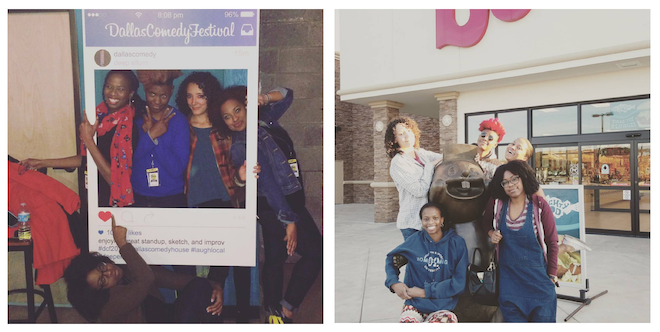
The Ginas at Dallas Comedy Festival (left) and outside of Buc-ee’s, the world’s most necessary pit stop (right).
You talked about being treated a certain way during scenes or in comedy in general and have to speak up. Do you feel like you’ve inspired change or inspired others to speak up now?
Xaria: Yeah, we’ve inspired everyone. [All laugh] Well, Sugar Water Purple started after us.
Tauri: I also think that people now see us as broader characters than as just “the black girls.” Before, if you entered the scene, it’d be like, “Oh hi, Shaniqua.” It makes you realize how they’ve boiled you down as a performer and how they think you’re one-dimensional. You’re only capable of being this.
Ronnie: That has happened to, I think, all of us. We were the only black person in a troupe, and in every scene, you’re a Jamaican or you’re Shaniqua, or you could not possibly be someone’s child or girlfriend or wife because you don’t look like them. It’s always like, “We have to explain you or at least clarify that you’re black.”
Cene: We have to let the audience know you’re black in case they don’t know. [Laughs]
Maggie: “We know she knows she black, but we want you to know that we know.” [All laugh]
Ronnie: Once we were horses, and I was the black stallion, and I was like, “Why do I got to be the black stallion?! Everyone out here is, like, unicorns and shit, and I gotta be the black stallion?!” Like, you know? So we don’t have to do that in this troupe. There was a scene where Xaria was a white man, and it was funny!
Cene: Was that the scene where she was like, “Let’s do cocaine off this shark!” [Laughs]
Ronnie: That was the scene where Xaria ran over a bunch of people and was like, “I did it!” [All laugh]
Tauri: Oh yeah, that was in Night Watch. Night Watch was a run of shows we did based on people of color and their experiences with the law and the police. Shit was funny.
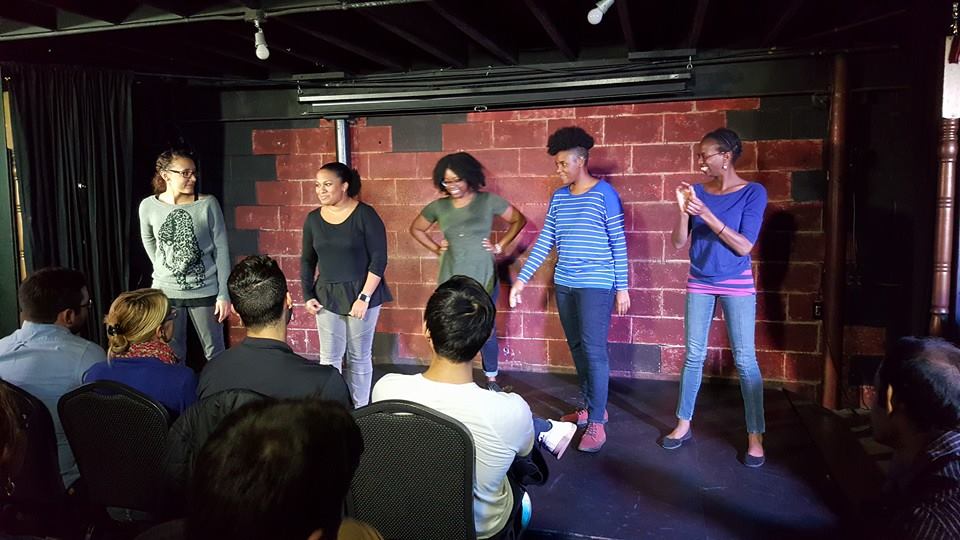
Cene: That was a good show. So good!
Ronnie: As part of that show, I personally wanted to illustrate to my friends, like, “Hey, you guys are all talking about Black Lives Matter, but you don’t realize that every day, when I get in my car, I have to worry about if I am going to get pulled over and how I am going to get treated.” You don’t think this shit happens, but it happens in Austin, and it happens to me. So Night Watch was, like, let’s share these stories and let’s fucking make fun of it but know that this is my everyday life. And I’m in the same socioeconomic group you are, I come from the same kind of background you come from, but when I drive my dad’s Mercedes, I get fucking pulled over like I’m not supposed to be driving it, you know?
Xaria: I don’t know about “inspired,” but I know before us, there wasn’t a lot of diversity, and now, I’ll be around the theater and classes will come out, and there are people of color.
Maggie: And to piggyback on that, I’ve noticed that we have a disproportionate amount of black people that attend our shows, like, a lot more than I notice attend other shows. People say, “We’ve heard about you” or Sugar Water Purple.
Ronnie: People—not even just people of color, but people of different sexualities and stuff—are coming out to our shows because they’re like, “Oh finally, this isn’t just a bunch of white dudes in plaid shirts.” Sometimes they see us, and then they stay for the next show. It makes the theater more inviting for other people.
Xaria: Yeah, yeah. Different stuff’s going on. Different people are around. Even at other theaters there are other minority troupes and things like that.
Cene: I’d like to think that we were the trigger for that. Because, Maggie was here for a long time, and then Xaria was here for a long time before, and then I came in, and it still was staying kind of stagnant. Then, once we got together, that’s when I noticed the change. Now granted, it could have been happening before, but—
Maggie: I’ll say it! We were the trigger to that! [All laugh] We started that whole thing going. We started a black movement in Austin improv.
Xaria: [Laughing] Shots fired!
Maggie: Sugar Water Purple, come fight me!
Ronnie: Once Kerri prints this, it’s true! [All laugh]
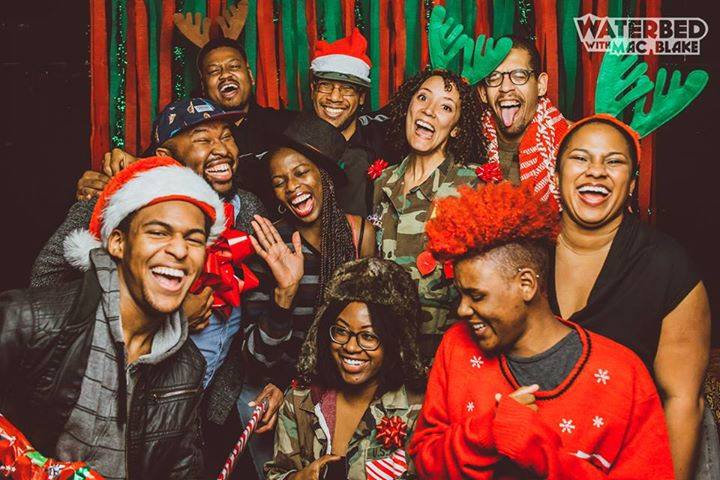
Damn Gina and Sugar Water Purple
[Laughs] That’s right! Sounds like you’re really changing a lot to me.
Tauri: I think that what we’re really broadening—and I think that it’s important to broaden—is what you think a black character has to be. Because most of our characters aren’t explicitly any race. They’re just characters. We are allowing ourselves to be human characters without an expressed or implicit caricature of what that ethnicity has to be. Because we now see within TV, for instance, we have more, and people are used to, the smart black girl. So we rose to smart black girl. But is she the ingénue? Is she the sassy black girl? Does she have to snap her fingers and roll her neck? Is she really smart but over-sexualized? When I see that, I go, “Oh, look, massa still going after her!” Which is funny because my husband is white. [Laughs] But the characters that we put on are just a crazy mom. She doesn’t have to be any specific thing. We’ve all read those castings where the black girl is either the Beyoncé or the Kelly, but you can’t be the anything else. Or you have an agent that isn’t willing to put you up for a specific part because you aren’t enough of this or that.
Cene: Enough! Yes.
Tauri: We’ve been told, “Oh, wear your hair curly so that you can pass for the Latino.” “Oh, you can just say you’re Dominican.” Really?! Those sorts of things are where I think we’re helping the people who see our shows broaden what a character can be and happen to be black as opposed to being “the black character” that has to be all of these things…and has to justify being black as well, as we said before. I think that’s one really important thing we’re doing. We’re talking about race in a way that it’s like…there has to be some funny so that you don’t cry. And we’re also talking about it from a middle- or upper-middle-class background where it’s not like, “Oh in my projects, this happened.” That is the path for a lot of people, but we can talk about it from a standpoint that takes socioeconomic status out of it and removes education from it—because you can’t say any of us are uneducated. You can’t bill those classic responses for racism against any of us, so we bring a really different tint to the conversation. I think that’s been interesting because it’s also undeniable that when you are laughing at me, you’re getting it. So that’s really good.
Ronnie: It’s nice to see characters up there on stage that remind you of your family or what you grew up with. We all have very dynamic people in our lives, and it’s cool to see them represented where it’s not, like, a stereotype or one- or two- dimensional person. Sometimes I’ll be in the scene with Tauri, and I’ll be like, “Is this my grandmother?!” [Laughs] You don’t get to see that with the stock kind of character that you see in improv shows, and it’s fun to kind of blow people’s minds. Because there’s a lot of times where I can go, like, a whole week of shows and not see someone who’s coming where I come from. Yeah, it’s still funny, but you also feel a little bit more at home when you feel like you can really identify with the character.
Xaria: Also, talking about inspiring, I hope that maybe there’s another all-black female troupe that comes in. We want more. We’re not like, “This is our territory!” [All laugh]
Maggie: [Laughing] We’re the black girls in this town!
Tauri: [Laughing] There’s a dance-off movie coming to theatres!
Xaria: We definitely want to inspire more people and have more people come into the comedy world and see and do what Tauri said.
Ronnie: It’s not even about the comedy world. I have nieces and nephews, and I just want them to feel like their voice is important. You can express yourself, and you can change people’s minds and their opinions and their hearts about you, but you can also sustain yourself. For me, it literally changed my whole life…in my thirties! I was withering away in a cubicle, being so fucking miserable, and then I wrote a fucking play, and I did all of this stuff that I didn’t even know was in me. Now, every morning, I wake up, and I punch the sky, and I’m like, “Let’s fucking do some shit!” [All laugh] I want my nephews and nieces to know that they can do that. That you can be intelligent, and your intelligence doesn’t have to do with any standardized test. It can just be like, “I can express myself, and I can articulate my point of view, and people will pay attention.” You might touch them in some way and make the world a better place.
Cene: Aw!
Tauri: That was a Michael Jackson song. [sings] Heal the world. Make it a better place. [Laughs]
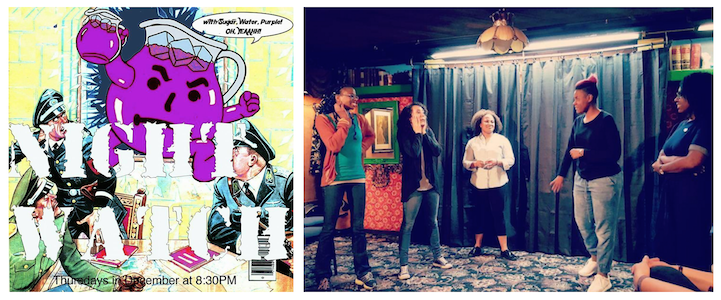
Night Watch promo (left) and the Ginas on stage (right)
Your message about characters and identity and all of this great stuff…you’re choosing to express these ideas and realities through humor. I’m guessing that means that you see humor as an important way to communicate, which I totally think is true! But why is that, in your experience?
Ronnie: I think that the development of a sense of humor was a defense mechanism for me. Growing up, I felt like a giant alien pretty much everywhere I went. I always knew that if I could make someone laugh, I could make someone like me. Or it gave me another place to view the world from. My humor was, a lot of the time, just my outside perspective. It would be hilarious to people, but most of the time, I was just telling my truth. [Laughs] I just needed it.
Cene: I grew up in sort of a…it wasn’t a difficult situation, but it was, you know, working class, single mom, and when you grow up in that, you use humor to deal with hard things because if you can’t make something funny or laugh at it, then it’s just sad, and everything’s sad. It’s a lot easier to figure out what makes it funny…and then you can connect with somebody.
Xaria: I got bullied for a little while, and then I kind of…I didn’t become a bully. [All laugh] There was one girl that was bigger than me, and she picked on me and then one day, I don’t know, something just happened. I started making jokes and making people laugh. And I was like, “What? Everybody thinks I’m funny? This is cool!” [All laugh] My family is also the same way. My brothers are both real silly. My mom and dad are all real silly, too.
Ronnie: I always think it’s funny when people talk about the Jewish tradition of humor because, like, my family is hilarious. My grandma’s the funniest person I’ve ever met in my whole life! I think we all come from a background of people that had hardship and struggle in our lives and used their humor to get through it, and that’s been instilled in us
Maggie: About the Jewish history of humor: that’s the same with African-Americans. Our culture had a lot of hardship, and humor came out of that. For me, humor is so powerful. First of all, it’s spitting in the face of the things that scare you. It can’t scare you if you’re sitting there making fun of it. Humor also has the power to have longevity. Everyone can remember their favorite joke. People have that connection to something that made them laugh.
It seems like it’s a good way, too, to get people all in one room, having the same experience. Sort of having this group realization…while having a good time!
Maggie: There are some things that are funny because they’re funny, and then there are some things that are that extra level of funny because you understand it. You’ve experienced it. That shared-experience humor is so powerful. It’s even more funny because you know that it’s true.
I think there’s a lot to be said about how you can get to the truth through laughter or be able to put something out there in a joke that would otherwise be too uncomfortable to say.
Maggie: Satire is the highest form of comedy, but the intention of that is to cause people to realize the folly in their behavior and hopefully change their behavior. If you were to just say something straight up, people might get defensive. They might not be as receptive to it as if they see a version of themselves being lampooned. They may look at that instead and say, “I don’t want to be like that person. Maybe I can look into myself and change.” Humor has a disarming power that can cause change.
Ronnie: One of the tenants of comedy is truth. It’s ingrained in you that to be an improviser, to be a comedian, is to tell the truth and speak your truth. You can’t half-ass the truth when you’re doing it. Like, when Tauri does a scene and it’s her grandma, I’m like, “Oh shit, that’s my grandma!” [All laugh]
Tauri: I got to stop being grandma.
Cene: But that’s like your person, you know what I mean? They’re funny not because they’re trying to be funny. They’re funny because they’re like, “This is who I am, and I accept it.”
Ronnie: I want to be that person already. Like, “I don’t give a shit! Yeah, I ain’t got no bra on and my titties are hanging out! What! What!” [All laugh]
Cene: My grandma’s like, “Hand me my teeth, they’re in the cup over there.”
Ronnie: My grandma will straight up change wigs in the middle of the day, and be like “What!? I’m blonde now. Say something!” [All laugh]
[Laughing] There needs to be a grandma version of Kids Say the Darnedest Things. I love how much you guys love each other. Just being a part of this conversation is amazing for me! How does it feel to have a group that’s as tight as this?
Tauri: For me, it’s so special. We felt like family immediately. We haven’t been in a troupe for that long, but they came over to my house for my daughter’s birthday party, and they come over for holidays, and we are here for each other real hard. There’s a base of trust and respect in this group. We don’t just recognize and respect but also foster each other’s talents. So when we go on stage, we know we have each other’s back in a way that’s beyond what could ever be there with another improviser. I think the audience feels that.
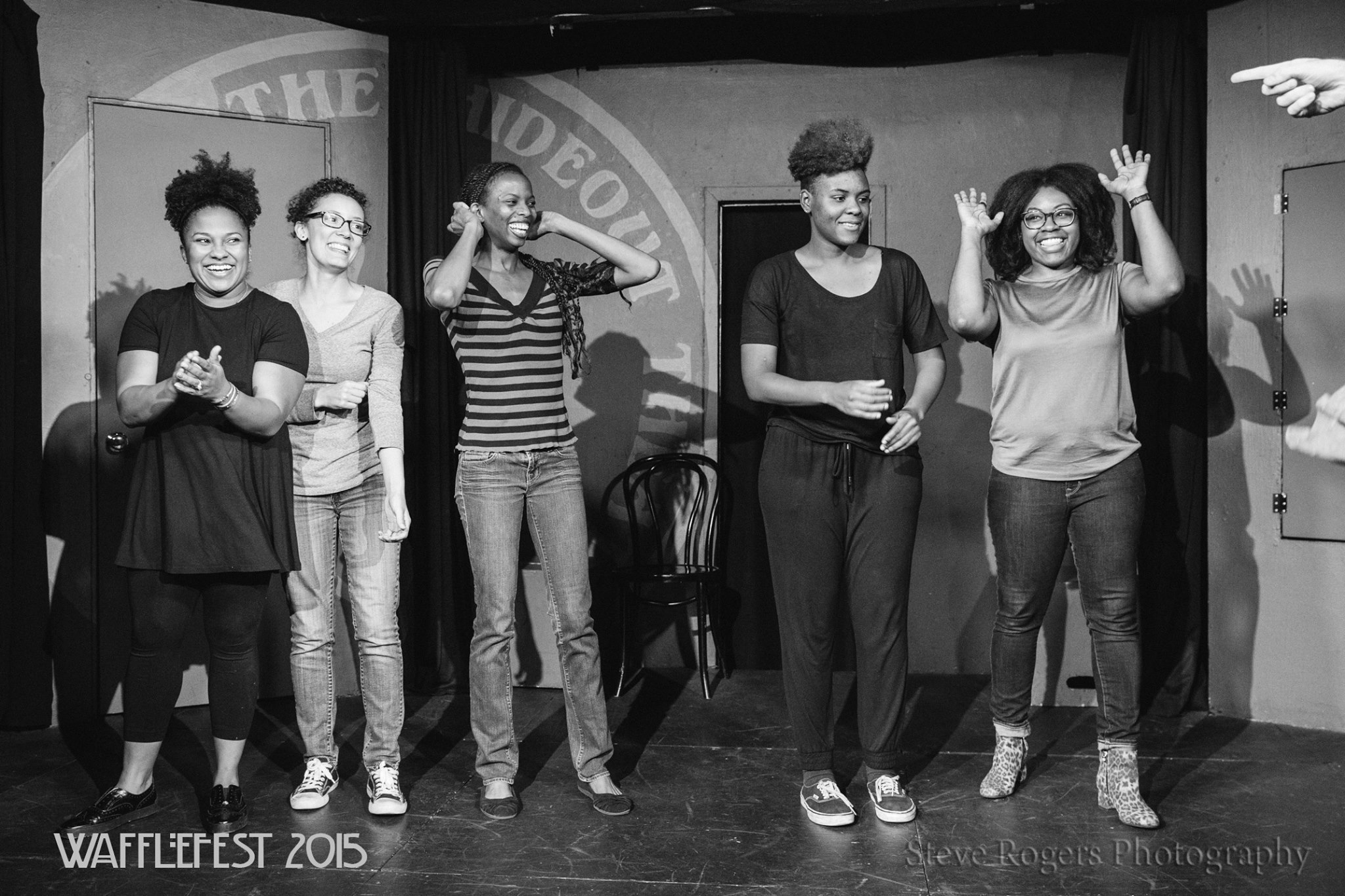
I want to talk a little bit about failure and self-doubt. Did you have a moment of self-doubt that you had to get past? How did you guys get over fear of failure to get where you are now?
Cene: I went to therapy. [Laughs]
Xaria: People say you have to go through stuff to succeed. You have to fail to succeed. I was doing improv, and I left for a year. I felt like garbage. I was like, “I can’t do improv anymore.” Then I was like, “Naw, I got this.” I’d never asked anyone to be in a troupe with me. When I came back, this was the first group of people where I was like, “Hey, do you all want to be in a troupe with me?” I was, like, real nervous, but now here we are, having these amazing shows and doing interviews and stuff…I guess I had to fail and take a break to find what I wanted to do. And I’m thankful I had to go through what I went through because I wouldn’t be here with them if I didn’t.
Ronnie: I feel like the thing that improv teaches you is that failure is going to happen. You work against that fear of failure and learn to adjust to everything that comes your way. You’re building that muscle when you do improv, and it becomes easier to flex that muscle in everyday situations. That’s what has been the most powerful thing for me about it. When you stop worrying about failure, you realize that there’s always something to engage with even when something goes wrong. It’s also redefining what success is. I used to think going to college and graduating, having a fucking job to support myself was it. I don’t have that shit anymore, and literally the day I got laid off was one of the best days of my fucking life. I was giggling and happy. Two or three years ago, that would have ruined my world. But now, after doing the work with improv and doing the work on myself, I know that no matter what comes at me, I can handle it.
Tauri: I think that’s what struggle gives you. It gives you perspective so that you genuinely do really relish the good when it comes, and I also think that’s why having had struggle and having to work hard to choose to be involved in an art and practice an art means that you really appreciate it in a different way. We are smart enough to realize how special what we have is.
Xaria: It’s like they say the only rule is to have fun or whatever, but then everybody’s all in your shit. [All laugh] But we really do! We just have fun, and that’s why we’re successful. I mean, we’re working on formats and things like that, but we’re not like, “We have to be this!” “Oh you didn’t do this!” All the technical stuff will take care of itself If you’re having fun. Even if it doesn’t—
Cene: It still doesn’t matter! [Laughs]
Ronnie: Also, as a person of color, my parents always told me that I have to work twice as hard to get half as much. So failure was something that I dealt with every day because I often didn’t get recognized for the work I did. I often didn’t get my just due for the effort I put in because of my sex or color—I don’t know—but there were many times when I was overlooked or I wasn’t successful in someone’s eyes, and I knew I’d put in the work. So I don’t take any of that shit for granted, and I don’t take it to mean anything. I worked in a software company with a bunch of white males, and these dudes would try to teach me shit that I taught them! [Laughs] It’s like, “Who wrote the fucking manual? That was me!” I’m so used to that.
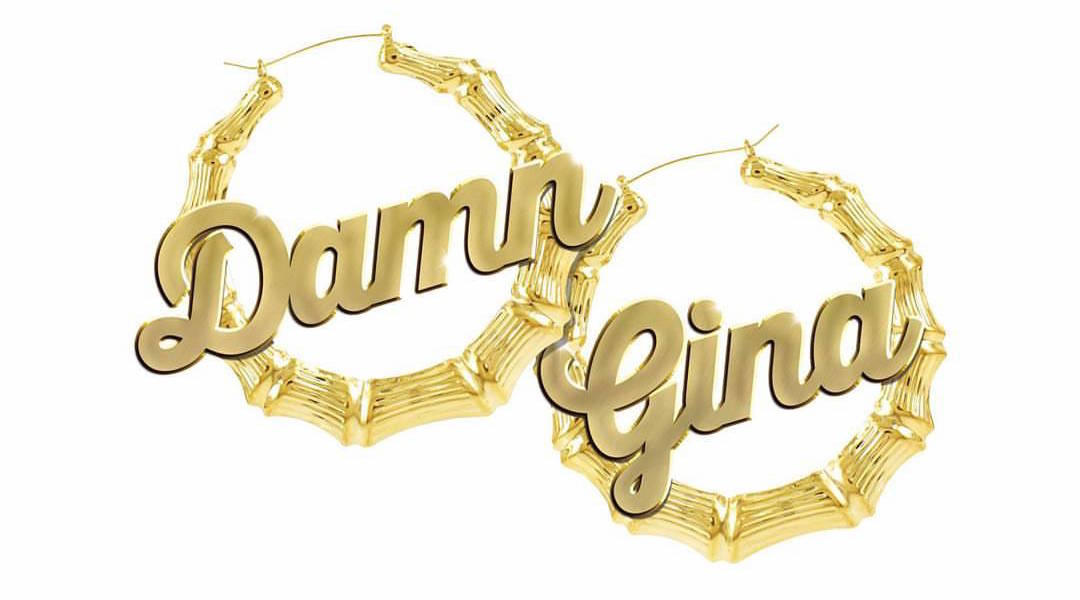
Do you guys have a plan for the troupe?
Tauri: I think one of the things we’ve talked about for this year is how we can further each other’s plans and each other’s goals. Like, the things that Cene wants to do, we all want to work on. How can we get that done? How can we be a part of it? How can we support Maggie? That’s really our goal right now.
Ronnie: Today, Tauri helped Xaria get a new scooter. Tauri’s going to help me update my resume so I can get a new fucking job that doesn’t suck all the life out of me. We just want to fucking make sure that we take care of each other and whatever happens, happens. But as long as we stay friends and fucking take care of each other, I’m totally happy.
Tauri: That’s the thing. I don’t foresee a time when we won’t have Damn Gina.
Xaria: We’re in each other’s lives now.
Cene: Yeah. They’re going to be at weddings and graduations and whatever happens in life.
Kind of along the lines of future plans, you talked about redefining success, which is definitely a part of what we want to do with Babe Squad. So I have to ask: do you consider yourselves successful, and how do you define success?
Ronnie: Yes, I definitely think of myself as successful, although I am in a very interesting part of my life right now where I kind of succeeded at all of my ambitions and did all that was expected of me for…probably way too long. Now that I got laid off from my job, I’m not sure where I’m going to get money and all that, but nothing’s worrying me. I finally have the freedom to pursue these things that interest me and make me who I am or make me excited to get out of bed every day. And I look at how hard I worked and how much I was able to accomplish at something that wasn’t even that important to me, and I know I can succeed at anything I put my mind to, especially if it’s something I love.
Cene: I had a similar experience to Ronnie. I had a job—a good job that paid well. I had a boyfriend. We lived in a really nice condo downtown, and my idea of success at the time was the things that we have, the money that we have. But once I sort of lost all of it—I kind of lost them all at once—I had to redefine what success was for me because, if I didn’t, I don’t think I would have made it. I don’t think I would have survived that. I’m starting to look at people that are in my life and what type of values they have to help me redefine success. The girls in Damn Gina have the values that I want to have, and so I feel like I’m successful in at least knowing that I needed to change my idea of what success is…does that make sense? [Laughs]
Maggie: I’m the same. I think, for me, success is not really having the fear of failure because it’s not going to break you.
Xaria: [Sighs] I don’t know. It’s so weird. When I was 19, my idea of success would have been being in California, doing classes at big theaters or whatever. But looking back on it, I was successful then. I was living on my own. I had my own car. I had my own job. I was taking classes and taking care of myself. Now, I’m not doing that, but I’m working towards my goals, so I still feel like I’m successful right now. Like, I don’t have everything. I can’t spend money on extravagant stuff and go places all the time, but I’m happy, and I’m doing what I love. So I’m successful, I guess, and hopefully a few years from now, I’ll be in a better place and still doing what I love.
Tauri: Yeah, that’s success. I’m a little bit [coughs] older than you. [All laugh] I’m a senior member. [Laughs] What I know from my life experience is that success is living in what your truth is and getting up every day and working toward your personal happiness, doing the things that make you happy. And whatever that is that day, do that. Do that because it’s for you, and you’re not living for other people or other people’s expectations of you or what other people want from you, but really living in what your gifts are. Our gift happens to make other people happy and bring them joy. And we, collectively and on our own, really like working with our gift, which, for these talented women, has meant expressing ourselves through comedy and getting to do that together. So we have an amazing level of success.
I’ve known CEOs and people who have so much monetarily but still don’t know who they are personally and aren’t seeking that. Being in art and living in your art means that you are actively seeking to grow who you are on a daily basis through your personal expression. You’re on a journey of understanding who you are better. Most people, after college, aren’t interested in personal growth, and if you ask people about personal growth they see it as seeing a therapist or reading a self-help book that is designed to help you placate your problems and feel better about that shit by blaming it on someone else. That’s what most people are doing for their “self-help.” To be actively choosing, in your adulthood, to build who you are and grow is a whole different model—that’s the ultimate level of success, and it’s the ultimate equalizer, in terms of comparing yourself to someone else. You can remove status from it, and it’s just who you are in yourself, in your soul, in your talent. To be working on that is amazing.
Follow Damn Gina on Facebook, Twitter, and Instagram for upcoming shows and more. Damn Gina is also on YouTube, where you can check out a clip of one of their shows. The Ginas have a lot going on outside of the troupe, too! You can find out about Maggie Maye’s upcoming stand-up shows on her website, Facebook, and Twitter. Check out Cene Hale’s acting and directing projects on her website, Facebook, and Twitter.

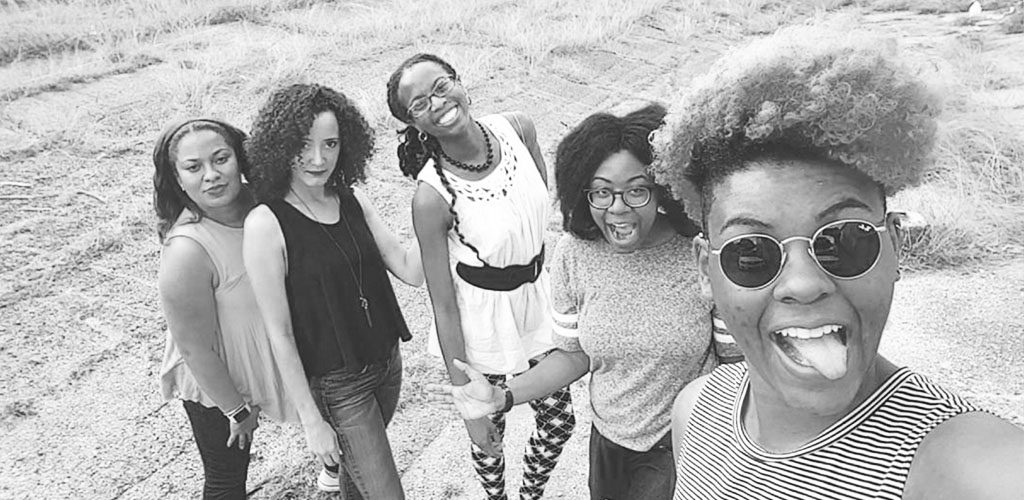
No Comments